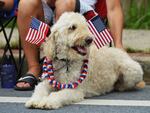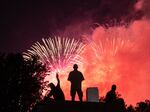
Dogs and cats can be particularly sensitive to loud noises such as fireworks. Here, a dog watches an Independence Day parade in Takoma Park, Md., in 2013.
Mandel Ngan / AFP via Getty Images
Fireworks, barbecues and activities with friends are all staples of the Fourth of July. But for pets and their owners, this holiday may present some added stress.
For some pets, especially dogs and cats with particularly noise-sensitive ears, the sound of fireworks can cause intense fear responses. Some pets will go to extremes to hide, others get startled and run away, and general anxiety caused by unexpected loud sounds can have long-lasting effects on animals.
Fortunately, there is plenty you can do to keep pets safe and relaxed over the holiday. Here, veterinarians and other animal experts weigh in on some of the best ways for pet owners to prepare for a stress-free Fourth.
1. Know your pets and make a plan based on their needs
Before making your plan, evaluate what your pet might need during the holiday. Pet reactions to loud noises or crowds can vary greatly, and each animal has its own way of coping with anxiety and fear, says Dr. Douglas Kratt, president of the American Veterinary Medical Association. If your pet has a history of anxiety, see a vet early about possibly prescribing medication to help the animal relax.
Having a plan in place and practicing it can ease stress and reduce the chance of danger in the case of an unexpected reaction, says Dr. Candace Croney, director of the Center for Animal Welfare Science at Purdue University.
"We should assume that even the pets that don't show an overt fear response [where they may be restless or panting] ... we should have a plan for those animals," she tells NPR. "If you have a new pet, assume that things will not go well, because then what we can do is act proactively."
2. Make sure pets can be easily identified
It's not uncommon for pets to have the impulse to run when they're startled. Kratt says lost pet reports spike around July 4-5, and many wind up at shelters.
"The vast majority of them are owned animals that got away because they were nervous or someone left the door open, so we want to make sure that we're going to maximize the potential to get those animals back with us," Kratt tells NPR.
Make sure you have a current picture of your pet on hand. Check that your pet's ID tags are secure and up to date with your pet's name and your contact information. If your pet is microchipped, make sure all the information is current.
If a pet does run away, call your local and surrounding county shelter and leave a missing pet report, says Meghan Herron, senior director of behavioral medicine education at the nonprofit Gigi's shelter for dogs. Post on social media, including local Facebook pages, and don't underestimate the power of missing pet flyers, she says.

Fireworks are a staple of the Fourth of July and other holidays, but they can frighten animals and pets. Here, spectators at the World War II Memorial watch Independence Day fireworks in Washington, D.C., in 2020.
Roberto Schmidt / AFP via Getty Images
3. Don't bring pets to fireworks displays
Kratt recommends leaving pets at home if you're planning to go out to see the fireworks. Not only can pets be overstimulated by crowds, he says, but fireworks can cause damage to their sensitive ears and cause fear.
"For the repetitive loud bangs — if that's making your ears ring or hurts your ears, it's definitely going to hurt your pet's ears," he says.
If your dog needs to go out, Kratt recommends a long walk before fireworks begin to wear your dog out and allow it to sleep or rest better in the evening.
4. Create a quiet, calm environment at home
Croney says that one of the most important things you can do for your pet ahead of the holiday is to create a safe environment inside your home.
Croney recommends closing and covering windows, relocating pet crates, beds or kennels to quieter places in the house, and putting on sounds other than fireworks, such as the TV, radio or white noise. Bring outdoor pets inside for the evening, and make sure they have plenty of room.
For pets that tend to hide when afraid or nervous, she says, allow them to do so. You can even set up places for them to go where they can feel safe.
"If you have cats who are known to retreat to certain places if they are scared, set them up there with a bed, their food and water," she says. "If you have dogs and they are crate trained, now is a great time to maybe move their crate to a part of the house that is least disruptive by noise."
No matter where your pets go to feel safe in the house, Croney recommends allowing them to come and go from their safe space as they please. Locking them in a single room or small space, she says, can sometimes increase anxiety. In extreme cases, Kratt adds, it can cause them to hurt themselves or damage items trying to escape.
5. If you're staying home with your pets, keep calm
It's easy to feel the urge to frantically pet or speak to your pets to calm them down when they are anxious, but one of the best ways to relax them when they are nervous is to remain relaxed yourself, Croney says. Worrying about how a pet might react to fireworks can actually affect the pet's feelings as well.
"Because our pets are so often attuned to our reactions, our anxiety about managing their potential anxieties around the unpredictable noises associated with Fourth of July fireworks can actually exacerbate the stress they might be experiencing," Croney says.
For pets that respond well to positive interaction when they're feeling nervous, Herron recommends distracting them with toys or treats. For dogs, she recommends puzzle toys that dispense kibble or treats to keep your canine focused for longer periods of time. Above all, create an environment that's positive and as close to normal as possible.
"You want to act very normal, and together, and act like this is the best day of your life," Herron says. "And so we get our treats, we play their favorite games, we find their favorite toy, we take it to our [safe space] and we try to have the best time that we can."
Copyright 2023 NPR. To see more, visit https://www.npr.org.